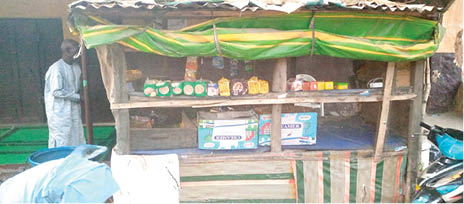Shayi business crumbles: Customers abandon noodles, eggs, milk
Tea selling joints are often regarded as lifesaving places for most bachelors, and to a larger extent, households in times of emergency. The business, also known as fast food in some quarters and one of the most lucrative in disguise, has kept the pockets of its operators full for decades owing to the numerous services […]

page 26 pic 1
Tea selling joints are often regarded as lifesaving places for most bachelors, and to a larger extent, households in times of emergency.
The business, also known as fast food in some quarters and one of the most lucrative in disguise, has kept the pockets of its operators full for decades owing to the numerous services rendered.
Tea lovers, especially bachelors, always patronise the joints in the morning and evening. And most of them are often located by roadsides in makeshift shops where they can be easily seen.
Although they may appear insignificant, some people have made it a habit to visit tea shops as their first port of call in the morning before reporting to work and the last place to visit at night before going to bed. It is mostly a meeting point for friends also to gist before closing for the day.
- Bauchi agog in honour of late Sa’adu Zungur
- The resilient thread: Funtua’s last standing cotton factory
Establishing a tea vending outlet does not take a fortune as all that is needed are tables, benches, a nice place to boil water or fry eggs, and provisions, including loaves of bread and noodles.
However, with the current economic hardship and the hike in the price of consumables—foodstuff and beverages in the country, the tea selling business is engulfed in a range of challenges with significant threat to its survival in northern Nigeria, where it is much pronounced and practised.
According to the Global Tea Market Size 2018-2026 report by Statista, the global tea market was valued at over $52 billion in 2018 and is projected to rise to over $81 billion by 2026.
When Weekend Trust visited a popular tea vendor, Murtala Muhammad, at the Fagge C area of Fagge Local Government Area, he said the economic downturn in the country was taking a toll on their business.
“Before the economic decline, things were normal and going well, but now, we are facing difficulties in the business.
“Everything we are using is expensive. Before now, I used to buy one and half mudus of sugar, but now, I only buy half. I don’t mix sugar with anything, so it is just to manage it like that.
“For noodles, I used to buy two cartons everyday, but now, I buy half carton. From three crates of egg, it is now half a crate. I used to buy different kinds and flavour of tea bags, like seven of them, but now, it is only three.
“There are no customers now; you will open and sit like that, unlike before when you had to engage more hands to help you. Nobody is buying because there is no money.
“When a customer that was used to eating three eggs, two noodles, tea with milk cannot buy half of that, you know there is a problem. Now, I hardly fry five eggs a day for customers,” Muhammad said.
It was gathered that before now, a cup of tea was N50, but it is now sold at the rate of N150 to N200, depending on the flavour. A sachet of noodles that was sold at N300 is now N500; and one egg that cost N100 is now N300.
Tea lovers who spoke to Weekend Trust lamented that they could no longer afford their favourite meals, so they have been forced to look for alternatives.
Anas Murtala said, “I used to eat eggs, noodles, tea and milk, but now, I buy tea without milk and bread. Before now, I would take tea with milk, beverage, and bread with butter, and noodles with eggs, at least three, but it is no longer so.
“The last time I ate noodles was over five months ago because I can no longer afford it.”
Our correspondent also gathered that while the cost of dishes served at tea joints is threatening the business, vendors are devising various means to maintain their customers.
One of the customers at tea joints, Ibrahim Umar, lamented that he had resorted to eating spaghetti in place of noodles owing to the hike in its price.
“This is where I eat in the evening hours everyday, except when I am out of town.
“It came to a point that I reduced my food to a single sachet of noodles and two eggs, but now, I can’t even do that, I only eat spaghetti. As you are aware, most of the tea sellers are now cooking spaghetti with beans, which is a little bit easier.
“We can no longer eat eggs and noodles; and even spaghetti is not everyday,” he said.
Shamsuddeen Sabiu also said that a tea vendor, Saleh Mai Shayi, had been his companion for years, but he was forced to look for an alternative.
He said, “I was used to eating noodles with eggs in the morning and evening everyday, but I no longer do that. The last time I ate noodles was two weeks ago.
“We now eat spaghetti and drink water. I drive a commercial tricycle, but honestly, it is difficult.”
Bilya Garba also said, “We can no longer eat noodles and eggs and tea with milk the way we used to; we are just managing. Honestly, things have changed and we are now devising other means to keep our stomachs full. As you can see, I am having a combination of cheap things to eat.”
